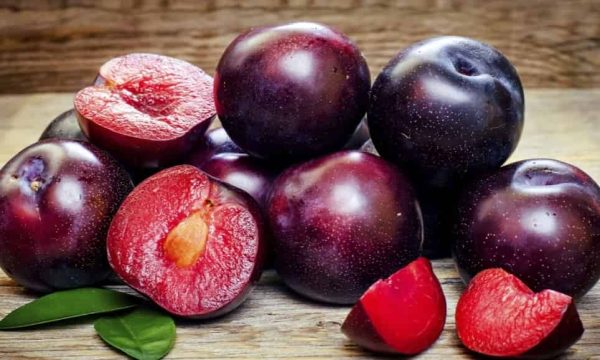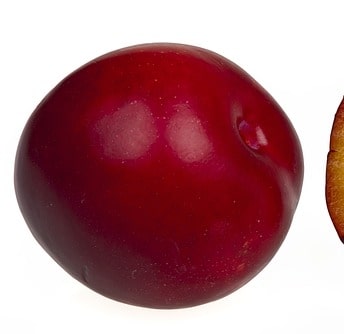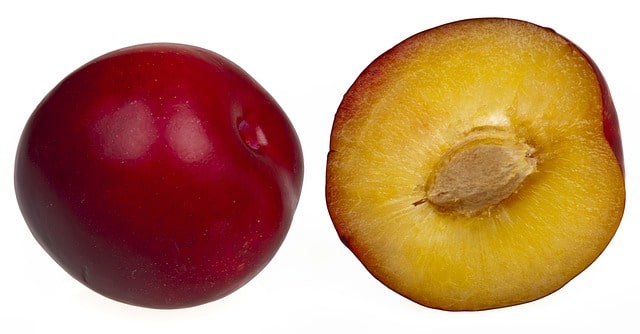What are plums?
Plums come from the family of peaches, apricots, and nectarines. This tree is used for its beneficial properties and for managing various conditions. They contain several minerals and vitamins. This fruit also has fiber and antioxidants that may help reduce your risk of several chronic diseases. All varieties have a stone in the center of the fruit which is not edible. You can consume plums fresh or dried. While dried, plums are known as prunes. Plums come in a range of colors such as black, red, green, yellow, and even white colors.
1. Black Plums
The black plums are dark-colored, purplish-blue plums. They taste sweet but the Damson plums are a bit tart. Black plums provide many health benefits such as,
- They can treat stomach pain.
- Can relieve digestive problems.
- They contain magnesium that can prevent diabetes, migraine, or cardiovascular disease.
- Black plums have phosphorus that promotes bone and teeth health.
- Contain vitamin B6 which helps boost the immune system.
2. Yellow Plums
Yellow plums are sweet in taste. These plums provide many health benefits such as,
- It contains potassium, a mineral that regulates muscle and nerve function.
- This plum has vitamin A.
- It is loaded with fiber which helps in regulating blood sugar, and digestion, and helps you feel full longer.
3. Red Plums
These are the plums with reddish skins. Red plums have a sweet, sour, tart taste to them. These plums provide many health benefits such as,
- Can treat constipation issues.
- It is loaded with vitamin E which can help immune functioning and eye health, and has anti-inflammatory properties.
- They have anthocyanins and zinc.
- Red plum contains manganese and copper.
4. Green Plums
Green plums are also sweet-tasting plums. These plums are even harvested when they are unripe for their tart, sour flavor. Green plums provide many health benefits such as,
- They can fight the effects of Alzheimer’s.
- Green plum contains lutein which promotes eye health.
- Prevent anemia.
- The plum has folate which is important for the formation of red blood cells.
Health Benefits of Plums
1. Promote Bone Health
Plum is considered the most effective fruit for preventing and reversing bone loss. This fruit contains vitamin K. This nutrient helps improve calcium balance in the body. It boosts bone health. Dried plums also increase bone mass density. It is also considered an ideal food for preventing bone loss in postmenopausal women.
2. Rich in Antioxidants
Plums are a fruit rich in antioxidants that are helpful for reducing inflammation and protecting your cells from damage by free radicals. They are loaded with polyphenol antioxidants which have positive effects on bone health.
3. Help Lower Your Blood Sugar
Plums contain properties that may help with blood sugar control. Even after being high in carbs, it do not appear to cause a substantial rise in blood sugar levels after they’re consumed. Plums also have fiber. Fiber slows the rate at which your body absorbs carbs after a meal, causing blood sugar to rise gradually, rather than spike.
4. Benefit Heart Health
Regularly consuming plums can have a protective effect on heart health. Studies found that plum offers the potential to reduce cholesterol levels and high blood pressure. Mice fed dried plum powder and plum juice have the ability to increase “good” HDL cholesterol. The positive effects of plums to have on heart disease risk factors are because of their high content of fiber, potassium, and antioxidants.
5. Improves Memory & Brain Health
Studies found that plums are rich in antioxidants, and they can slow the development of Alzheimer’s disease. It also contains anthocyanin and quercetin, both beneficial in supporting a healthy brain.
How to Use Plum?
- Look for plums that are slightly firm, juicy, and sweet. Don’t go for those that are already soft or bruised.
- One can eat plums raw.
- Plums can be added to pies, ice pops, oatmeal, salads, and ice cream.
- It can be consumed with yogurt or as smoothies, cakes, and pudding.
- Plum can be used to make alcoholic drinks like wines.
- Dried plums are also used to make snacks, juice, jelly, powder, and jam
Side Effects of Plum
- Drinking large quantities of plum juice can experience digestive problems such as bloating, flatulence, and indigestion.
- An individual might experience allergic reactions by eating plums. As it contains a component that is considered a potential allergen showing immunoglobulin E.
- Plums reduce urinary pH. This may cause kidney stones. While people with a history of kidney stones must avoid plums.
- Additionally, a person should make sure not to blend, crush, or chew a plum stone. The seeds of stone fruit contain amygdalin, a chemical that the body converts into the toxin cyanide.





